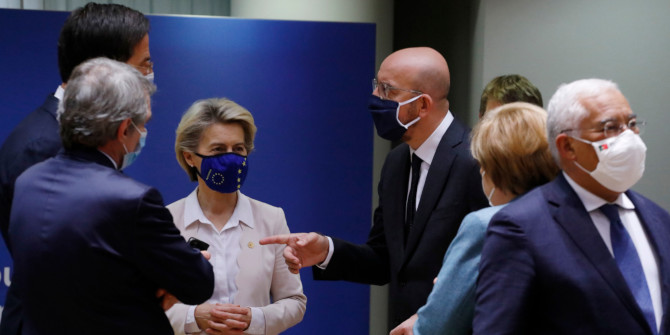In December, EU leaders reached agreement on a €750 billion pandemic recovery fund, financed by joint borrowing. However, the implementation of the fund has already encountered difficulties in the EU’s three largest states, with more trouble potentially on the horizon.
The EU finally agreed on its next multi-annual budget and a €750 billion recovery fund just before Christmas. In order to receive money, all EU member states must now draft national recovery programmes and submit them to the European Commission by 30 April 2021.
Yet the three biggest member states, Italy, Germany and France, are all facing difficulties as their governments attempt to draft these plans. Italian Prime Minister Giuseppe Conte was left without a majority when his junior coalition partner Italia Viva quit the government in a row over spending priorities in the national recovery programme. Now Mario Draghi is trying to form a new government. Meanwhile, the European Commission is reportedly unhappy with the draft proposals of the German government in its programme and Bruno Le Maire, the French Finance Minister, has labelled the recovery fund “technocratic” and “too slow”. These squabbles only broke out in the first few weeks of 2021.
A cumbersome but carefully designed system
The decision-making procedures are indeed complex and designed to ensure that the money is well-spent. EU member states have delegated these competences to the European Commission because they distrust each other. The task of the European Commission is primarily to assess if national spending plans are consistent with the recommendations for structural reforms that have been set out by the EU in so-called country-specific recommendations.
This new system of applying for recovery money completely revamps the EU’s economic governance framework. In the past, a country like Germany with a large fiscal surplus could easily ignore EU recommendations for economic reforms, although in practice the German government has previously endorsed them as part of normal decision-making procedures. Many other member states in contrast have neither obeyed the fiscal rules nor followed the economic recommendations. They were never sanctioned. When former Commission President Jean-Claude Juncker was asked in 2016 why France wasn’t sanctioned after breaking the fiscal rules he famously replied, “because it’s France.”

In order to build trust that the recovery money is being well spent, scrutiny of the recovery programmes at the EU and national levels is necessary. Fiscally hawkish countries only reluctantly agreed to the recovery fund and they obtained an ‘emergency brake’ against disbursing money. This mechanism foresees that a single member state can bring an issue to the attention of the heads of state and government in the European Council, where it will then be discussed. Member states had been reluctant to raise their voices against each other in the system of economic governance that existed prior to the pandemic, but the existence of common debt across member states has changed the issues at stake. The money spent will no longer be repaid by a respective country’s taxpayers alone – instead it is intended to be paid for jointly via new EU taxes.
The early troubles that have been experienced are therefore no surprise. The procedures in the regulation do not cover the national level. The involvement of each national legislature, for instance, remains at the discretion of each national government. National parliaments were involved in the pre-pandemic economic governance of the European Semester, although unevenly. No model or best practice for parliamentary involvement emerged. However, parliamentary involvement was beneficial under the old governance model as it helped create ownership and hold the executive accountable. Under the new governance model it is essential that national parliaments maintain the ‘power of the purse’ and have the possibility to scrutinise national recovery and resilience programmes.
More trouble ahead
The link between economic reforms and disbursements via the EU regulation on the recovery fund, however, could easily spark further trouble. Wolfgang Schäuble, the President of the Bundestag and former German Finance Minister, weighed into the debate recently, urging countries to implement tough reforms. This is likely to pit some member states against others, much as the Eurozone crisis led to divisions between Germany and Greece, and the recovery fund negotiations saw disagreements between Italy and the Netherlands.
Even countries that originally pushed for the recovery fund might turn against it, as Bruno Le Maire’s objections demonstrate. While the recovery fund has the long-term objective of making Europe greener and more digital, which makes a lot of sense economically, the French rush seems to have an ulterior political and electoral motive: namely to retain power at the country’s presidential election in May next year. The first disbursements are scheduled to take place in the second half of 2021 and for some governments, the clock is ticking as they seek to orchestrate a rapid economic recovery.
To establish coherence with pan-European priorities and ensure projects produce genuine European added value, national parliaments and the European Parliament could jointly monitor the recovery plans. This would help trigger national parliamentarians’ interest in what is going on beyond their national borders. Otherwise, there will be a long line of junior coalition partners ready to exert influence on spending decisions while governments are reluctant to be constrained by European spending priorities.
This blogpost was first published on the LSE EUROPP Blog.


